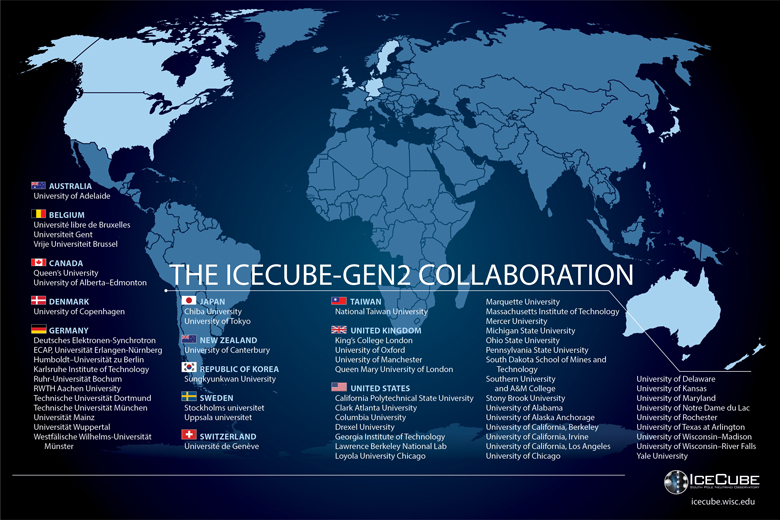IceCube-Gen2 partners
More than 430 scientists at 61 research institutions from 13 countries and four continents will be involved in the planning, construction, and operation of the IceCube-Gen2 project. Most of the partners have been successfully working together on the IceCube project since 1999; some even contributed to previous projects at the South Pole.
IceCube-Gen2 builds on the extensive experience gained from the IceCube project, and continues with a strong, reliable team. Cooperation will broaden to include new technologies and research projects. The host institution for IceCube-Gen2 is the University of Wisconsin-Madison, USA, which also headed the initial IceCube project and the intermediate IceCube Upgrade. The University of Wisconsin is also responsible for the day-to-day operations of the neutrino observatory at the South Pole.
Leading partner institutions around the world take on additional crucial responsibilities. For example, DESY will produce one-third of all the new sensors, known as digital optical modules, for the expanded detector. In Europe alone, 18 research groups are taking part in the planning for IceCube-Gen2.

IceCube-Gen2 worldwide
- 13 nations
- 61 institutions
- More than 430 researchers
- Over 20 years of collaborative experience
German involvement
Germany is the second biggest contributor to the international IceCube team after the USA, with around a quarter of all scientists involved. German institutions are represented at all management levels of the IceCube Collaboration. As the largest European partner, DESY provides one of the two coordinators of IceCube-Gen2. Furthermore, ten German universities are involved, with the Karlsruhe Institute of Technology as both a university and – like DESY – a Helmholtz Center.
The working groups in Germany are making important contributions to the future of the IceCube-Gen2 project. For the preparatory phase – the IceCube Upgrade – the Erlangen Center for Astroparticle Physics developed the concept of the new optical sensors. DESY is responsible for the overall “optical sensors” work package, which is being carried out through a partnership with German universities led by the University of Münster (mDOM) and the University of Mainz (alternative sensors). The RWTH Aachen and the Technical University of Munich are making crucial contributions to the calibration concept of the IceCube Upgrade and IceCube-Gen2. KIT Karlsruhe is responsible for the development and construction of the surface detectors for the IceCube’s expansion. The TU Dortmund is making a significant contribution by developing methods for artificial intelligence and machine learning.
Funded by a strong community
The German involvement in IceCube is funded by the Federal Ministry of Education and Research (BMBF), the Helmholtz Association, the German Research Foundation (DFG) and the participating universities. Cooperation between universities and non-university research institutions for the IceCube Upgrade is organized as part of the BMBF’s “ErUM-Pro” program.
In addition, there are grants for clusters of excellence such as “PRISMA+ – Precision Physics, Fundamental Interactions and Structure of Matter” at the Johannes Gutenberg University Mainz, and “ORIGINS – From the Origin of the Universe to the First Building Blocks of Life” with the participation of the Technical University of Munich. Funding has also been granted by the DFG for two Collaborative Research Centers (Sonderforschungsbereiche) SFB 876 “Data Analysis under Resource Restrictions” at TU Dortmund, and SFB 1258 “Neutrinos and Dark Matter in Astro- and Particle Physics” at TU Munich. Professor Dr. Anna Nelles, Radio Array Group at FAU Erlangen-Nuremberg, has been funded with an Emmy Noether grant from the DFG and the Helmholtz W2 program. Dr. Frank Schröder, scientist at the Karlsruhe Institute of Technology (KIT) and Assistant Professor at the University of Delaware, USA, has received a European Research Council (ERC) Starting Grant.
IceCube in Germany
- 10 universities
- 2 Helmholtz Centers
- KIT is both a university and a Helmholtz Center
Spokesman for the German IceCube consortium:
- Professor Klaus Helbing
- University of Wuppertal
Co-Coordinator of the international IceCube-Gen2 Collaboration:
- Professor Marek Kowalski
- DESY & HU Berlin
